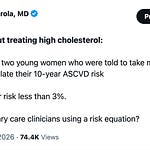This week, I talk with Andrew Foy, who is an academic cardiologist at Penn State University in Hershey, PA. Andrew is one of the smartest voices in medicine today.
We start with the REMEDIAL trial, published recently in JAMA. Ablation vs Meds. Primary endpoint—depression and anxiety. One of the main issues was the control arm—namely that there was no sham control.
We referenced this useful review paper on placebo and nocebo effects in cardiology, from Brian Olshansky.
Our second topic was the FRAIL AF trial.
This was frail, elderly patients who had AF and were stable on Vitamin K antagonists (similar to warfarin) were randomized to remain on the VKA or switch to a direct acting oral anticoagulant. Primary endpoint—major bleeding.
FRAIL AF is in Andrew’s wheelhouse as one of his primary academic areas of study is the role of multi-morbidity in translating medical evidence.
He mentions a term called heterogenous treatment effects or HTE. I don’t love the term because it’s heavy into jargon. But HTE is super important for using evidence in the clinic. Andrew explains it well.
Here is the editorial Andrew co-authored regarding another important trial in elderly patients who were having NSTEMI.
I have written about FRAIL AF on Medscape and Sensible Medicine.
We were going to talk about coronary artery calcium screening, but we had talked enough and will do a separate podcast on CAC.
As always, let us know what you think. We appreciate the support. Thank you. JMM












